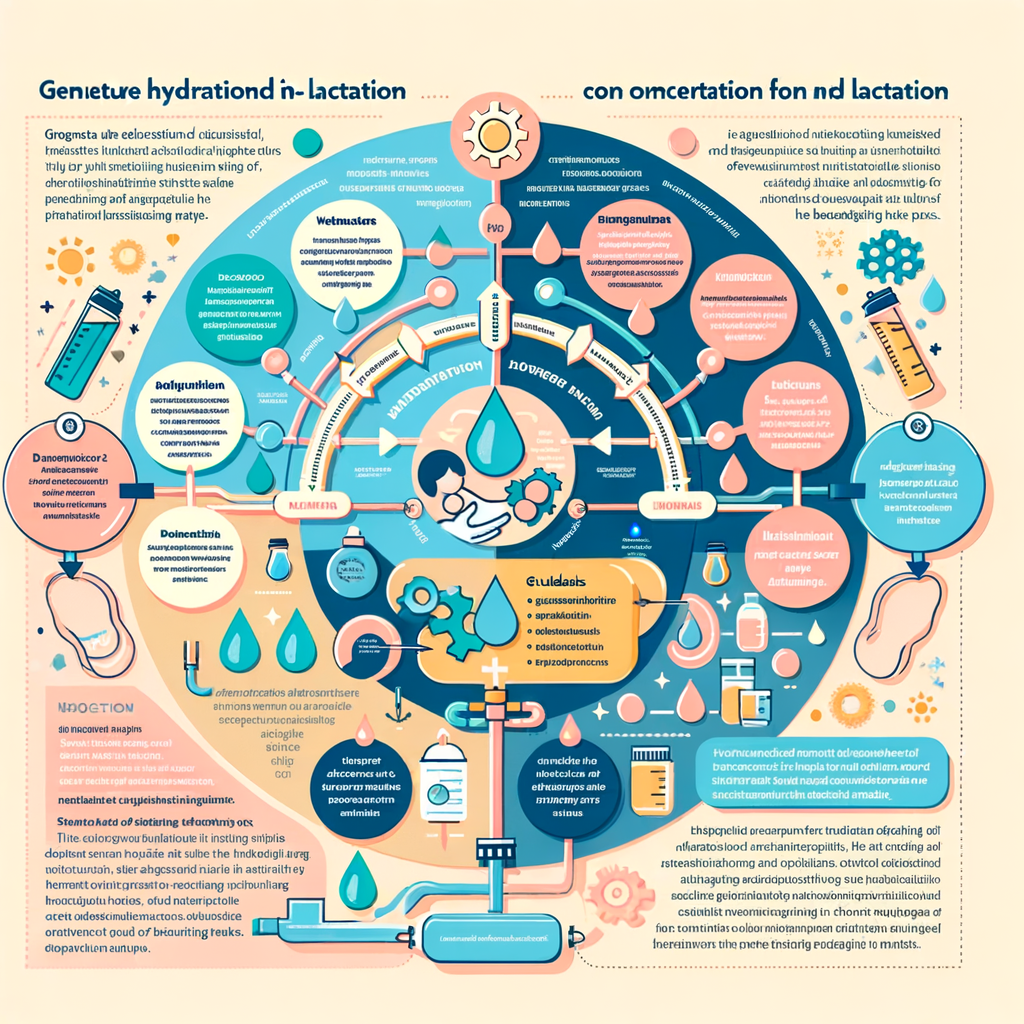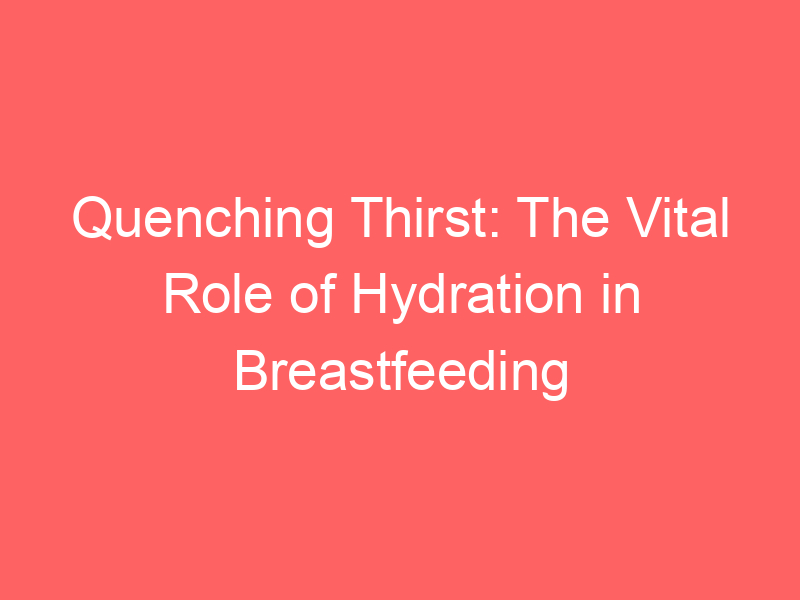Introduction: The Importance of Hydration in Breastfeeding
When it comes to breastfeeding, one aspect that often gets overlooked is hydration. Staying well-hydrated is not only essential for the health of the mother but also plays a crucial role in the production of breast milk. This article aims to shed light on the importance of hydration in breastfeeding and provide practical tips to ensure adequate hydration.
-
- Overview of breastfeeding hydration tips
Hydration is key to successful breastfeeding. Drinking plenty of fluids, especially water, helps maintain a healthy milk supply. It’s recommended that breastfeeding mothers drink at least 8 cups of water each day. However, the exact amount can vary depending on factors like the mother’s body weight, activity level, and the climate. It’s also important to listen to your body and drink when you’re thirsty. Other hydrating fluids like milk, juice, and herbal teas can also be included in your diet.
-
- The role of water in breastfeeding
Water plays a significant role in breastfeeding. About 87% of breast milk is water. When a mother is well-hydrated, her body can produce enough milk to meet her baby’s needs. Dehydration, on the other hand, can lead to a decrease in milk supply. Besides, staying hydrated helps the mother stay energized and cope with the physical demands of breastfeeding. It also aids in recovery from childbirth and helps maintain overall health.
Understanding the importance of hydration in breastfeeding and implementing practical hydration tips can make the breastfeeding journey smoother and more successful. In the following sections, we will delve deeper into the relationship between hydration and lactation, provide practical tips for staying hydrated, and share real-life case studies highlighting the impact of hydration on breastfeeding.
Understanding Hydration and Lactation
Hydration and lactation are two interconnected aspects of breastfeeding. Understanding their relationship can help mothers ensure they are providing the best nutrition for their babies.
The Science Behind Hydration and Lactation
Let’s delve into the science behind hydration and lactation to better understand how they influence each other.
-
- How hydration affects breast milk production
Hydration plays a crucial role in breast milk production. The human body needs water to produce milk, which is about 88% water. When a mother is well-hydrated, her body can produce breast milk more efficiently. According to a study, mothers who drank more fluids produced more milk.
-
- The importance of fluids in lactation
Fluids are not only essential for milk production but also for maintaining the mother’s health during lactation. Breastfeeding can cause mothers to lose more fluids through milk, leading to dehydration if not replaced. This can affect the mother’s overall health and the quality of the breast milk. Therefore, it’s important for breastfeeding mothers to increase their fluid intake.
In conclusion, staying hydrated is essential for both the health of the mother and the quality of the breast milk. It’s important for breastfeeding mothers to understand the science behind hydration and lactation to ensure they are providing the best for their babies.
Effects of Dehydration on Breastfeeding
Dehydration can have a significant impact on breastfeeding. It can affect both the mother’s health and the quality and quantity of breast milk produced. Let’s delve into the details.
Physical effects of dehydration on the mother
Dehydration can lead to various physical effects on a breastfeeding mother. It can cause fatigue, dizziness, and headaches, making it difficult for the mother to take care of her baby. Severe dehydration can also lead to a decrease in blood volume, which can affect the mother’s overall health and well-being. According to a study, dehydration can also affect the mother’s cognitive functions, making it harder for her to focus and make decisions.
Impact on breast milk production and quality
Dehydration can also have a direct impact on the production and quality of breast milk. Breast milk is composed of about 88% water. When a mother is dehydrated, her body may struggle to produce enough milk to meet her baby’s needs. According to a study, dehydration can lead to a decrease in milk volume and can also affect the nutritional content of the milk. This can have a direct impact on the baby’s growth and development.
In conclusion, staying hydrated is essential for a breastfeeding mother. It not only ensures her well-being but also guarantees that her baby gets the best quality and quantity of breast milk. So, it’s crucial for mothers to consume enough fluids and stay hydrated while breastfeeding.
Staying Hydrated for Breastfeeding: Practical Tips
Staying hydrated is crucial for every nursing mother. It not only helps maintain your health but also ensures the production of enough breast milk. Here are some practical tips to help you stay hydrated while breastfeeding.
Drinking Water While Breastfeeding
Drinking water is a simple yet effective way to stay hydrated. But, how much water should you drink and what are the best practices for water intake during breastfeeding? Let’s find out.
-
- Best practices for water intake during breastfeeding
It’s important to drink water regularly throughout the day. Try to have a glass of water every time you breastfeed. This practice not only keeps you hydrated but also helps stimulate milk production. Also, keep a water bottle handy, especially when you are on the go. This will ensure that you have easy access to water at all times.
-
- How much water should a nursing mother drink?
While there’s no one-size-fits-all answer to this question, a good rule of thumb is to drink at least 8-10 glasses of water a day. However, this can vary depending on factors like your body weight, activity level, and climate. If you’re feeling thirsty or your urine is dark yellow, it’s a sign that you need to drink more water. Remember, staying well-hydrated is key to successful breastfeeding.
Staying hydrated while breastfeeding is not just about drinking water. It also involves including hydrating foods in your diet and avoiding dehydrating substances like caffeine. So, make sure to follow these tips and keep yourself well-hydrated for successful breastfeeding.
Hydration Tips for Nursing Mothers
Staying hydrated is crucial for nursing mothers. Here are some practical tips to help you maintain optimal hydration levels.
Keeping a Water Bottle Handy
One of the easiest ways to ensure you’re drinking enough water is to always have a water bottle within arm’s reach. This can be especially helpful during breastfeeding sessions. The act of breastfeeding can make you feel thirsty, and having water nearby can help you quench that thirst immediately. A water bottle is a constant reminder to drink up. You can opt for a reusable water bottle to help reduce plastic waste and contribute to environmental conservation.
Hydrating Foods to Include in Your Diet
While drinking water is important, you can also hydrate your body through the foods you eat. Many fruits and vegetables have high water content and can contribute to your overall hydration. For example, cucumbers, watermelons, strawberries, and oranges are all over 90% water. Including these in your diet can help you stay hydrated. Similarly, soups and broths are also a good source of hydration. They can be a warming and comforting addition to your diet, especially during colder months.
Remember, staying hydrated is not just about drinking water. It’s about maintaining a balance in your body. So, while you focus on hydration, don’t forget to eat a balanced diet that includes a variety of nutrients. This will help you stay healthy and provide the best nutrition for your baby.
For more information on hydration and lactation, you can visit the Wikipedia page on breastfeeding.
Case Studies: The Impact of Hydration on Breastfeeding
Let’s delve into some real-life examples to better understand the importance of hydration in breastfeeding. These case studies will shed light on how increased water intake can affect breast milk production and how to overcome dehydration challenges during breastfeeding.
-
Case study 1: The effects of increased water intake on breast milk production
A study conducted by the World Health Organization observed a group of breastfeeding mothers who increased their daily water intake. The results were quite revealing. Mothers who drank at least 8 glasses of water per day produced significantly more breast milk than those who drank less. This increase in milk production led to healthier, more satisfied babies.
Key takeaway: Drinking plenty of water can boost your breast milk production, leading to healthier babies.
-
Case study 2: Overcoming dehydration challenges in breastfeeding
In another study, a group of breastfeeding mothers were facing dehydration challenges due to hot weather and lack of access to clean water. With the help of a local health organization, these mothers were provided with clean drinking water and educated about the importance of staying hydrated. Over time, these mothers overcame their dehydration challenges and were able to produce sufficient breast milk for their babies.
Key takeaway: Overcoming dehydration challenges can significantly improve your ability to produce breast milk. It’s crucial to have access to clean drinking water and to understand the importance of staying hydrated.
In conclusion, these case studies highlight the importance of hydration in breastfeeding. By drinking enough water, you can increase your breast milk production and overcome any dehydration challenges. Remember, your hydration is key to your baby’s health and growth.
Conclusion: The Vital Role of Hydration in Successful Breastfeeding
In this article, we have explored the crucial role that hydration plays in successful breastfeeding. From understanding the relationship between hydration and lactation to practical tips for staying hydrated, it’s clear that maintaining proper fluid levels is a key factor in ensuring a healthy breastfeeding journey. Let’s recap our key takeaways and provide some final thoughts on breastfeeding hydration tips.
-
- Key takeaways on the importance of staying hydrated for breastfeeding
Staying hydrated is not just beneficial for the breastfeeding mother’s health, but it also directly impacts the quality and quantity of breast milk. Dehydration can lead to a decrease in milk production, making it difficult for the baby to get the necessary nutrients. Moreover, staying hydrated can help mothers avoid common breastfeeding complications like blocked ducts and mastitis.
-
- Final thoughts on breastfeeding hydration tips
While it’s important to drink plenty of water, remember that hydration also comes from other sources like fruits, vegetables, and soups. Avoid drinks that can dehydrate you, such as those with high caffeine or sugar content. Always keep a water bottle handy, especially during breastfeeding sessions. Listen to your body and drink when you’re thirsty. Remember, every mother’s hydration needs may be different, so it’s important to find what works best for you.
In conclusion, hydration plays a pivotal role in successful breastfeeding. It’s not just about drinking more water, but making smart choices about what you drink and when. By staying hydrated, you’re not just taking care of your own health, but also ensuring your baby gets the best nutrition possible.
Remember, breastfeeding is a journey, and every journey is unique. Stay patient, stay hydrated, and know that you’re doing the best for your baby.














